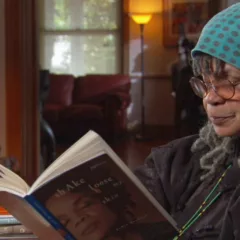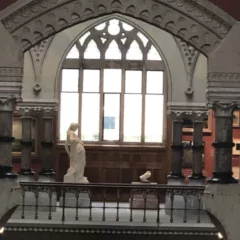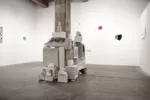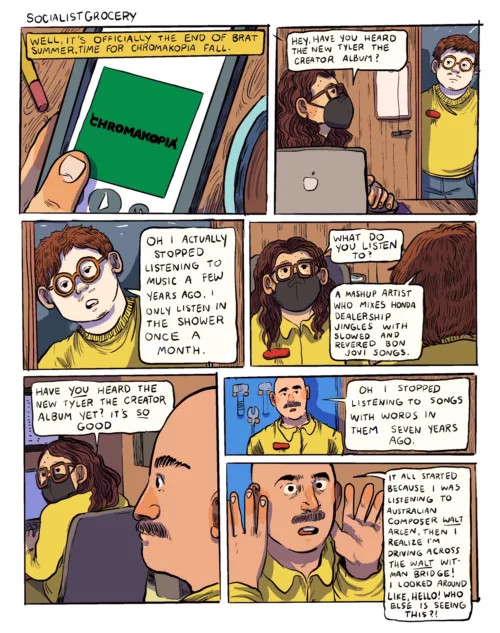This week’s Weekly has my interview with Malcolm Mclaren, whose video Shallow 1-21 opens this week at Pennsylvania Academy of the Fine Arts’ Morris Gallery. Below is my copy with some pictures.
Before he became the godfather of punk Malcolm Mclaren — founder and manager of the Sex Pistols — was an art student and a mischief-maker. Mclaren’s new video at Pennsylvania Academy of the Fine Arts proves he’s still out to make trouble as well as art.
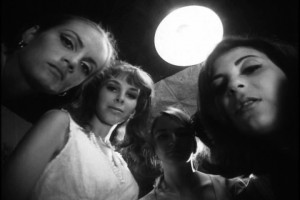
Shallow 1-21, a mash-up of 70s-era porn film imagery (no sex just the build-up) and pop love songs, is both shallow and not. With dated visuals that are campy and funny/sad, and dance-beat updates of classics like “Foxy Lady” “She’s Not There” “I Want to be Loved By You” and “My Funny Valentine” the piece is eye and ear candy. But Mclaren’s embrace of pop culture is also a comment on the lies that we love to hear; lies that pop culture tells so well.
I met Mclaren in August when he visited Philadelphia to meet with PAFA curator Julien Robson and look over the museum and the Morris Gallery where Shallow 1-21 would screen. It was his first trip to Philadelphia although maybe he was here with the Sex Pistols, but he doesn’t remember. He’d certainly never been to PAFA before, which he called “adorable.”
“It reminded me of going to museums in the 60s. It’s anti-corporate; not packaged,” he said. McLaren should know about packaging — he (and his then girlfriend Vivienne Westwood) invented the ripped-pants-and-safety-pin-pierced style of punk, a style so lasting you can buy it today on South Street.
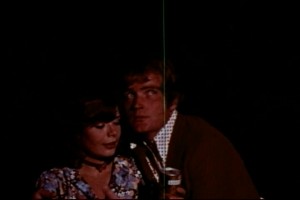
Mclaren (b. 1946) is a raconteur of the first order. And when he turned on the juice and stared at a place on the wall behind me and began to tell his tale, it was clear he was channeling another time and place. The words flowed out of him like chocolate in one of those chocolate fountains–a force without stopping, a stream of spicy colors, characters and scenes a bit too rich and delicious — but totally captivating.
As a young impressionable teenager in London Mclaren had a classical art school education, drawing from life and from plaster casts like those in the Academy. He listened to lectures of poetry while surrounded by the art of the romantic visionary William Blake. One larger-than-life teacher drilled into him the fact that art was not a career but “the noble pursuit of failure.”
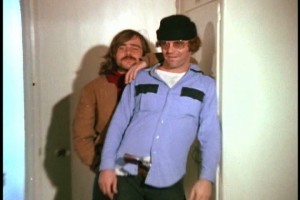
“It’s better to be a magnificent failure than a benign success,” said this teacher. And for Mclaren “That was my ground rules and that changed my life.”
“At 17, you’re vulnerable to this…indoctrination. It took me eight years of art school to digest it. It gave you a new perspective,” he said, adding it sparked his “art into action” thinking, which resulted in punk rock.
I couldn’t get many words in edgewise but I asked if Mclaren was a musician. “I’m not a musician. I’m a trained painter,” he said. Then, explaining much about his affinity for style and clothing he said his grandparents were master tailors and his mom was a corset maker. And, “Dad and mom made cheap fashion ripoffs.”
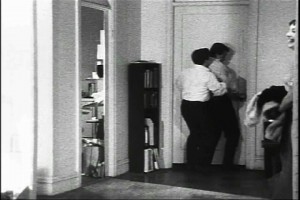
After art school Mclaren had a crisis of confidence, not knowing what to do next. He was depressed and desperate. Then, inspired by Elvis, he made “a sparkling blue lame jumpsuit and walked the walk on King’s Road” in hopes of getting noticed. Nobody noticed except one man.
“A man dressed in black crossed my path. He was tall, big, handsome. Spoke like an American. He said “What are you doing around here?” I was dumbstruck. He said “I’ve got stuff, man, you want to see it?” I said yeah. He pointed to a tin shack…I hadn’t even noticed it before then.”
Inside the shack, the room was painted black and had a mirror ball. A guitar-shaped mirror and ripped blue jeans were on the wall. A free jukebox played 50s music–it was a rock memorabilia den. “I thought, This is marvelous. I want to stay here,” Mclaren said.
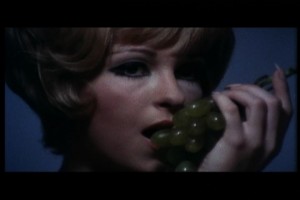
The American, Brad, asked Mclaren if he had “stuff” and offered him a spot to sell his wares. “I ran home and phoned my friends and said bring your stuff. We brought flea market stuff…brought boxes to the man’s shop and hung around the jukebox.”
Brad disappeared and put Mclaren in charge warning him not to sell any of his things. But McLaren sold a bunch of Brad’s torn jeans and t-shirts anyway then got worried and made replicas by distressing and tearing and dying some new-bought things til they looked old and dirty — it was the beginning of the punk look.
One of Mclaren’s customers was the advertising mogul Charles Saatchi who bought a Chuck Berry single “Let It Rock” and then came back to buy out “85 percent of the store.” “He was collecting fetishistic objects; collecting the stuff of rock and roll,” he said, adding, “Now he collects art fetishistically.”
When Mclaren opened his next shop on King’s Road he called it “Let It Rock” in memory of those early days. He’d become “a tradesman in rock and roll,” he said.
Then came the “Sex” boutique. “I decided to have a shop that was all about what 13 year old boys wanted — sex.” They made sex clothes where “everything should fit Vivienne who had the body of a 13-year old.” The shop became a hangout for the young. The Sex Pistols was an outgrowth of that time.
Best of all, he said, he’d accomplished that romantic artistic goal of achieving success outside traditional capitalism.
Speaking of his new video, Mclaren said he was inspired to make the piece by Mexican artist, Stefan Bruggemann, who was curating a show at Gallery 1-20 and wanted him in the show. “He [Bruggemann] said, “The title of my show is shallow.” The way he said it almost frightened me…Shallow. It’s a word used to describe pop culture and pop rock. I’ve been called shallow.” So he decided to be in the show and make the work.
“I rarely look at video art. I’m not interested. It bores me,” he said. He sees his own video vignettes in Shallow 1-21 as “magical portraits” or “musical paintings,” something more like an update of WIlliam Blake, who “is all about sex and death in the most symbolic manner.”
>>Malcolm McLaren:Shallow 1-21. Oct. 24-Jan. 3, 2010. Opening reception Oct. 23, 6-9 pm. Lecture by the artist and reception, Nov. 5. FREE. PAFA Morris Gallery. Broad and Cherry St. 215 972 7600.



